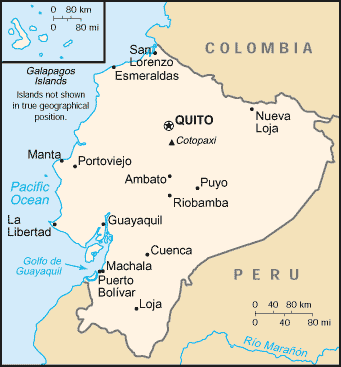Capital: Quito
Population: 13 million (UN, 2003)
Year of Independence: 1822, from Spain
Type of Government: Republic
GNP: $39.6 billion (2001 est.)
Natural Resources: petroleum, fish, timber, hydropower
Political Parties: Concentration of Popular Forces (CFP); Democratic Left (ID); Ecuadorian Conservative Party (PCE); Independent National Movement (MIN); Pachakutik-New Country (P-NP); Popular Democracy (DP); Popular Democratic Movement (MPD); Radical Alfarista Front (FRA); Roldosist Party (PRE); Social Christian Party (PSC)
With the Andes, major urban centers, and fertile valleys fighting for domination of the Ecuadorean landscape, this country has one third of its workforce participating in agriculture, making it vulnerable to changes in international food markets. With petroleum and assorted industries contributing to the national economy, it experienced economic growth in the latter half of the twentieth century. Under democratic rule since 1979, the nation has a multiparty system but its current president, Lucio Gutierrez, has no established party to support him. Ecuador switched to the U.S. dollar as its national currency in 2001 to fight excessive inflation rates and the effects of having the country’s wealth tied up in a minority of its people, mostly in the hands of those of Spanish descent. Gutierrez faces social unrest: indigenous groups and a full 60 percent of the country live in poverty, and there are frequent protests of the current corrupt, unjust system of government.



